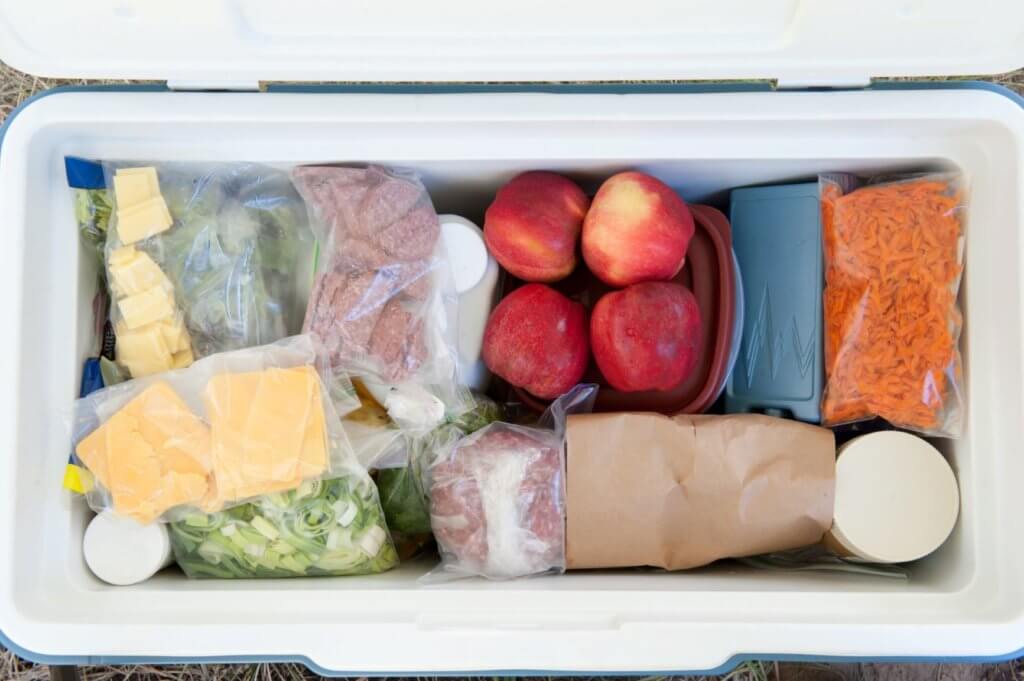7 tips to reduce food waste when camping

It’s the time of the year when we pack up the car and head off to the beach, bach or bush for a wonderful few days or week of summer bliss.
Camping – or staying in a hut, caravan or bach – can have its challenges when it comes to cooking and eating, particularly in regard to food safety and wastage.
The biggest issue when camping is keeping food cold and safe. Without proper refrigeration the risk of food poisoning can increase, and if in doubt, we end up throwing away the food.
Here are seven tips for how to reduce food waste when you are camping or staying somewhere with limited cooking facilities:
1. Plan your meals
Planning your meals before you leave home means that you can reduce how much food you need to buy, transport and store. It also reduces the chance that you will have excess food which ends up going to waste.
If you are going on holiday to a place without access to a supermarket, you will need to be savvy when planning your meals. Try to find out what sort of items you can get at the local shop, dairy or roadside stall. This will cut down the list of items you need to bring and means they will last longer because they will be fresher.
If there is no way to top up your supplies, plan meals that use fresh produce for the first couple of days, and then resort to things that used canned goods, like bean burritos, for the later days.
It is also wise to choose meals that are easy to make because your kitchen facilities will be severely limited. The easier the meal is, the more likely it is you will actually make it, rather than ordering fish and chips for the second night in a row.
If you are going camping with friends or family, make sure to coordinate meal plans and shopping lists so you don’t double up on items or miss something important.
One way to make things easy is to cook easy-to-heat meals at home and freeze them to take with you. A big batch of mince that can be used as a spaghetti sauce or as a filling in wraps. Just make sure it is something that will reheat well with the cooking method you will have available.
2. Freeze everything you can
Freeze all of your meat, milk, bread, hummus and other freezable items before you go on holiday. This is great for two reasons: the frozen items can act as ice packs to keep other foods cold, and it also makes them last longer.
Use things in the order that they defrost.
3. Prioritise what goes in the chilly bin

Cold space will be in hot-demand, so make sure your give priority to the perishable items like meats, dairy, dips and vegetables, rather than drinks. In addition to your chilly bin, take extra chilly bags.
Keep the chilly bin and bags in a shaded place, out of the sun and try not to open them more than necessary. If you do have enough room for drinks, try to have them in a separate chilly bin so you aren’t opening the food cooler all the time.
If using ice in your chilly bin, consider using salt ice as it will last for much longer.
4. Containers, containers, containers
Take as many airtight containers as you can to store food in.
They are useful for many reasons, but particularly for keeping food protected from water in your chilly bin or bag.
If you are staying in a campground or hut where there is a communal fridge, it is much easier to label a container with your name than to try to write it on a bag.
Having empty containers also makes it easier to store leftovers and snacks like chips or crackers. Bonus: they also keep bugs out of your food.
5. Eat the perishable items first

Some of your foods will go bad much faster than others, so make sure you eat them first.
Vegetables like lettuce and tomatoes, will go off much faster than capsicum and cucumber. Apples and oranges will last longer than peaches and plums. Plan accordingly so you can still have fresh produce in the second half of your trip.
Hard cheese will keep longer than soft cheese.
Beware of bread in the humid temperature – it is likely to go mouldy very quickly if not kept in a chilly bin or fridge. For longer lasting alternatives, buy packaged tortillas.
6. Don’t cook more than you need
Storing leftovers safely can be difficult when you have limited cold space, so only cook as much as you need for each meal.
As appetites may be larger than usual due to days spent exploring it can be hard to know how much you will need. Try to only cook the portions that you usually would, and then use other items like bread or fresh fruit to fill up hungry tummies.
7. Investigate options for disposing of food scraps

If you are staying at a campground, find out if they have any options for disposing of food waste. You never know, they may have an on-site compost or worm farm.
If not disposing of your food scraps daily, make sure to bring some thicker plastic bin liners to stop birds ripping open your rubbish bag.
Check to see if there are any community gardens nearby that will be willing to take your scraps.
If you are in a bach, check to see if there is a council-run food scraps collection and find out what exactly you can put in there.
If you are doing lots of fishing, share your unwanted fish heads and frames via the free fish heads app.